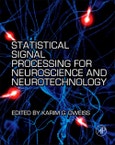This is a uniquely comprehensive reference that summarizes the state of the art of signal processing theory and techniques for solving emerging problems in neuroscience, and which clearly presents new theory, algorithms, software and hardware tools that are specifically tailored to the nature of the neurobiological environment. It gives a broad overview of the basic principles, theories and methods in statistical signal processing for basic and applied neuroscience problems.
Written by experts in the field, the book is an ideal reference for researchers working in the field of neural engineering, neural interface, computational neuroscience, neuroinformatics, neuropsychology and neural physiology. By giving a broad overview of the basic principles, theories and methods, it is also an ideal introduction to statistical signal processing in neuroscience.
Please Note: This is an On Demand product, delivery may take up to 11 working days after payment has been received.
Table of Contents
Introduction; Detection and Classification of Extracellular Action Potential Recordings; Information-Theoretic Analysis of Neural Data; Identification of Nonlinear Dynamics in Neural Population Activity; Graphical Models of Functional and Effective Neuronal Connectivity; State-Space Modeling of Neural Spike Train and Behavioral Data; Neural Decoding for Motor and Communication Prostheses; Inner Products for Representation and Learning in the Spike Train Domain; Signal Processing and Machine Learning for Single-trial Analysis of Simultaneously Acquired EEG and fMRI; Statistical Pattern Recognition and Machine Learning in Brain-Computer Interfaces; Prediction of Muscle Activity from Cortical Signals to Restore Hand Grasp in Subjects with Spinal Cord Injury:
Authors
Karim G. Oweiss Associate Professor, Electrical and Computer Engineering, Michigan State University, East Lansing, MI, USA. Karim G. Oweiss received his B.S. (1993) and M.S. (1996) degrees with honors in electrical engineering from the University of Alexandria, Egypt, and his Ph.D. (2002) in electrical engineering and computer science from the University of Michigan, Ann Arbor. In that year he also completed postdoctoral training with the Department of Biomedical Engineering at the University of Michigan. In 2003, he joined the Department of Electrical and Computer Engineering and the Neuroscience Program at Michigan State University, where he is currently an associate professor and director of the Neural Systems Engineering Laboratory. His research interests are in statistical signal processing, information theory, machine learning, and control theory, with direct applications to studies of neuroplasticity, neural integration and coordination in sensorimotor systems, neurostimulation and neuromodulation in brain-machine interfaces, and computational neuroscience.Professor Oweiss is a member of the IEEE and the Society for Neuroscience. He served as a member of the board of directors of the IEEE Signal Processing Society on Brain-Machine Interfaces and is currently an active member of the technical and editorial committees of the IEEE Biomedical Circuits and Systems Society, the IEEE Life Sciences Society, and the IEEE Engineering in Medicine and Biology Society. He is also associate editor of IEEE Signal Processing Letters, Journal of Computational Intelligence and Neuroscience, and EURASIP Journal on Advances in Signal Processing. He currently serves on an NIH Federal Advisory Committee for the Emerging Technologies and Training in Neurosciences. In 2001, Professor Oweiss received the Excellence in Neural Engineering Award from the National Science Foundation.








